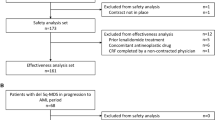Abstract
Azacitidine is now considered one of the standard-of-care agents for patients with high-risk myelodysplastic syndromes who are not candidates for high-dose chemotherapy. Considering the mechanism of action of the agent, it is critical to maintain adequate dose intensities for prolonged periods of time in order for treatment to be effective. Therefore, aggressive prevention as well as treatment of side effects is critical. The drug mainly causes hematological toxicity that is managed with growth factor support, blood transfusions, and dose and schedule adjustment. Nonhematological side effects are mainly gastrointestinal and cutaneous in nature, and can be easily managed with symptomatic treatment and correct administration techniques.
Similar content being viewed by others
References
Silverman LR, Demakos EP, Peterson BL, et al. Randomized controlled trial of azacitidine in patients with the myelodysplastic syndrome: a study of the Cancer and Leukemia Group B. J Clin Oncol. 2002;20:2429–2440.
Fenaux P, Mufti GJ, Hellstrom-Lindberg E, et al. Efficacy of azacitidine compared with that of conventional care regimens in the treatment of higher-risk myelodysplastic syndromes: a randomised, open-label, phase III study. Lancet Oncol. 2009;10:223–232.
Vidaza® [drug brochure]. Available at: http://www.emea.europa.eu/docs/es_ES/document_library/EPAR_-_Product_Information/human/000978/WC500050239.pdf. Accessed December 3, 2010.
Silverman LR, Fenaux P, Mufti G, et al. The effects of continued azacitidine (AZA) treatment cycles on response in higher-risk patients with myelodysplastic syndromes. Blood (ASH Annual Meeting Abstracts). 2008;112. Abstract 227.
Santini V, Fenaux P, Mufti GJ, et al. Management and supportive care measures for adverse events in patients with myelodysplastic syndromes treated with azacitidine. Eur J Haematol. 2010;85:130–138.
Fenaux P, Bowen D, Gattermann N, et al. Practical use of azacitidine in higher-risk myelodysplastic syndromes: an expert panel opinion. Leuk Res. 2010;34:1410–1416.
Batty GN, Kantarjian H, Issa JP, et al. Feasibility of therapy with hypomethylating agents in patients with renal insufficiency. Clin Lymphoma Myeloma Leuk. 2010;10:205–210.
Platzbecker U, Aul C, Ehninger G, Giagounidis A. Reduction of 5-azacitidine induced skin reactions in MDS patients with evening primrose oil. Ann Hematol. 2010;89:427–428.
Author information
Authors and Affiliations
Corresponding author
Rights and permissions
About this article
Cite this article
San Miguel Amigo, L., Franco Osorio, R., Mercadal Vilchez, S. et al. Azacitidine adverse effects in patients with myelodysplastic syndromes. Adv Therapy 28 (Suppl 4), 6–11 (2011). https://doi.org/10.1007/s12325-011-0024-2
Received:
Published:
Issue Date:
DOI: https://doi.org/10.1007/s12325-011-0024-2




